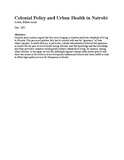| dc.contributor.author | Achola, Milkah Amolo | |
| dc.date.accessioned | 2013-06-28T08:03:46Z | |
| dc.date.available | 2013-06-28T08:03:46Z | |
| dc.date.issued | 2002 | |
| dc.identifier.citation | AMOLO, PROFACHOLAMILCAH. 2002. “Colonial Policy and Urban Health in Nairobi” in Azania, Journal of the British Institute in Eastern Africa Vol XXXVI – XXXVII – 2001 – 2002 by Andrew Burton (ed) British Institute in Eastern Africa, Nairobi.. | en |
| dc.identifier.uri | http://profiles.uonbi.ac.ke/mamolo/publications/%E2%80%9Ccolonial-policy-and-urban-health-nairobi%E2%80%9D-azania-journal-british-institute-east | |
| dc.identifier.uri | http://erepository.uonbi.ac.ke:8080/xmlui/handle/123456789/41587 | |
| dc.description.abstract | Colonial policy makers argued that they were bringing civilization and better standards of living to Africans. One perceived problem they had to contend with was the “ignorance” of their subject peoples. In health delivery, in particular, colonial administrators believed that ignorance accounted for the poor levels of health among Africans, and that knowledge and that knowledge and other preventive measures would greatly enhance standards of living, for instance, among urban Africans. In this paper we test this philosophy against colonial urban health policy’s and show that racism in the delivery of services greatly undermined African and Asian health in order to afford high quality services for Europeans in Nairobi. | en |
| dc.language.iso | en | en |
| dc.publisher | University of Nairobi | en |
| dc.title | Colonial Policy and Urban Health in Nairobi. | en |
| dc.type | Article | en |
| local.publisher | Faculty of Arts | en |

